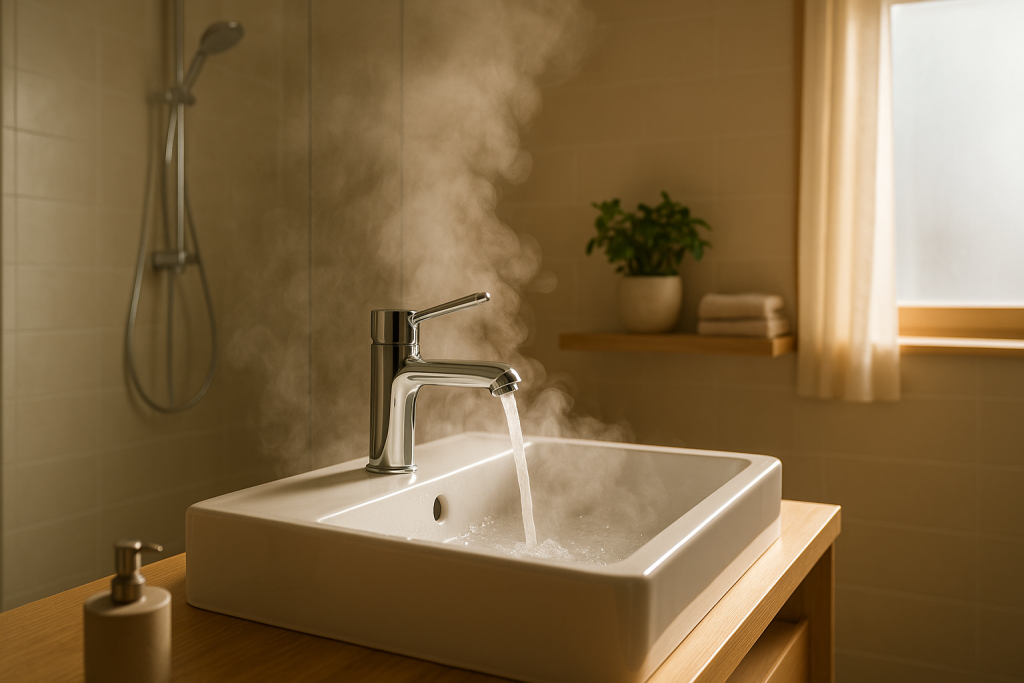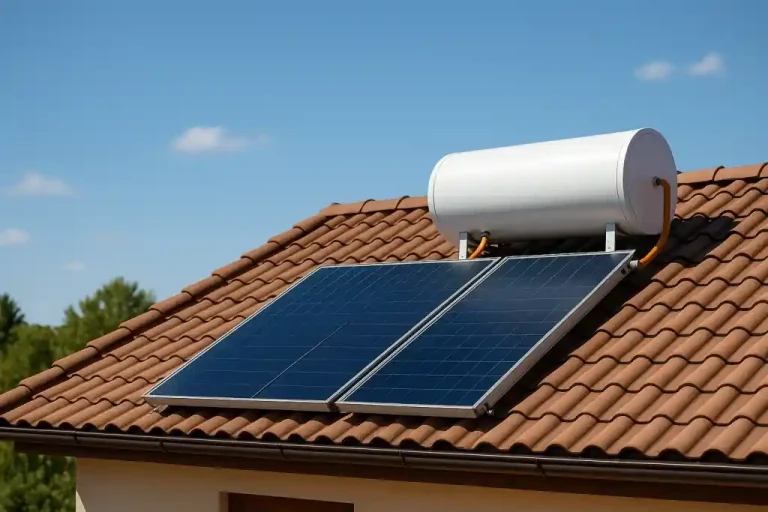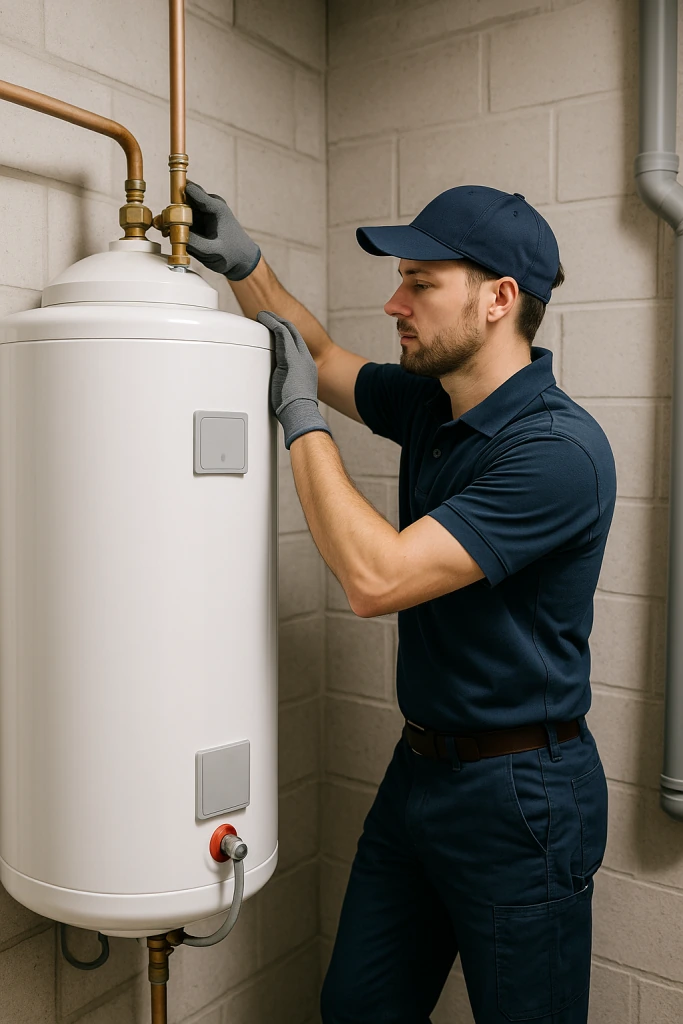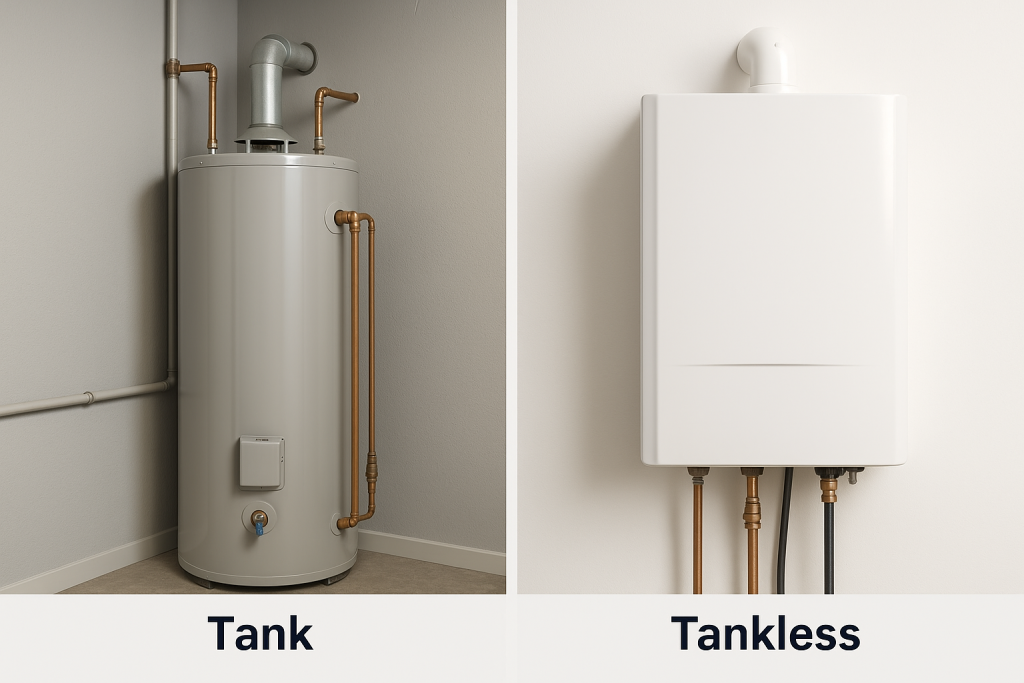
this water heater buyers guide begins with a clear purpose: to help you navigate the many options in today’s market and choose a unit that meets your household’s hot-water needs efficiently and cost-effectively. With the right approach, you’ll avoid common pitfalls such as oversizing, unnecessary energy loss, or frequent repairs.
Tank vs. Tankless: The Major Decision
One of the first choices you’ll face is whether to opt for a conventional storage-tank water heater or a tankless (on-demand) system. Storage-tank units store a fixed volume of hot water typical ranges might be 30–80 gallons after which the tank refills and reheats. While installation is straightforward and upfront cost more modest, these tanks are subject to standby heat loss and may struggle during heavy use. On the other hand, tankless systems heat water only when needed, eliminating standby losses, providing a virtually unlimited supply when properly sized, and often lasting longer. The trade-offs: higher installation cost, potential need to upgrade existing electrical or gas infrastructure, and limits if many fixtures are used simultaneously.
Fuel Source & Technology Options
Beyond tank vs. tankless, you’ll want to consider fuel type and special technologies. Common options include:
- Electric water heaters: Versatile and easy to install. Ideal for homes without natural gas, but higher operating costs in many regions.
- Gas water heaters: Provide fast recovery and work during power outages (depending on venting and pilot design). Typically better for medium-to-large homes with high usage.
- Solar water heaters: Use roof-mounted solar collectors to preheat water, paired with a backup system. Upfront cost can be high, but long-term savings and environmental benefits are strong.
- Heat pump (hybrid) water heaters: Extract heat from ambient air and transfer it to water. Very efficient in moderate climates, though they require space and consistent air temperature.
Each technology has advantages and trade-offs. Consider your climate, fuel availability, installation complexity and long-term operating costs when choosing.

Sizing, Cost & Lifespan Considerations
- Sizing: For tank systems, look at the first-hour rating (FHR), which indicates how much hot water can be delivered in the first hour of demand. For example, a family of four might need an FHR of 60–80 gallons depending on usage patterns. For tankless, look at gallons-per-minute (GPM) flow rate and match it to how many fixtures may run simultaneously.
- Cost & installation: Tank models typically cost less upfront; tankless or advanced systems cost more but may offer lower operating costs. Installation complexity (venting, electrical/gas upgrades, removing old unit) affects total cost.
- Lifespan & warranty: A typical tank unit lasts around 8–12 years; a well-maintained tankless unit may last 15–20 years or more. Check manufacturer warranties longer warranty often means higher-quality construction or components.
- Maintenance & longevity: Regular flushing for tanks (to remove sediment), and descaling for tankless units (especially in hard-water areas) will extend life and keep efficiency high.
Matching Your Home & Budget
Choose a system that suits your household size, hot-water usage habits, fuel availability, space constraints and budget. For example:
- For a smaller household with modest hot-water needs and no access to gas: an electric tank system may be fine.
- For a larger household or one that demands a lot of simultaneous hot-water use (multiple showers, appliances): a high-capacity tank or tankless may be better.
- For homes in moderate climates with utility incentives or a focus on sustainability: solar water heating or a heat-pump (hybrid) system might pay off long-term.
Remember: it’s not just the purchase price operating cost, lifespan, maintenance and space requirements all matter.

Professional Installation & When to Call for Help
Even the best water heater selection won’t perform right if installed poorly. Working with a licensed and experienced technician ensures: proper sizing, correct venting (for gas systems), safe connection to existing plumbing, adherence to local codes, and proper removal/disposal of old equipment.
If you notice issues such as inconsistent hot-water supply, strange noises, rust in the tank or fluctuation in water temperature, consider calling a professional for diagnosis. If your unit is over ten years old, or you’re facing repeated problems, it may be time for replacement rather than repair.
Final Thoughts
Choosing the right water heater is a long-term investment in your home’s comfort, safety and energy efficiency. By weighing the trade-offs of tank vs tankless, fuel type and technology, sizing and cost, and aligning the system to your household’s needs, you’ll be well-positioned to select a unit that serves reliably for years. With the guidance in this water heater buyers guide, you’ll make a smarter choice and avoid surprises down the road.
